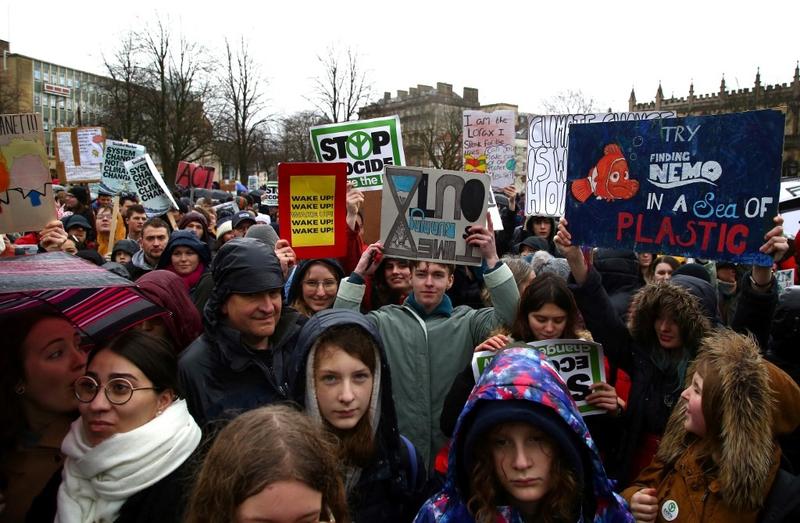 Young demonstrators hold placards as they attend a "Youth Strike 4 Climate" protest in Bristol, south west England on Feb 28, 2020. (GEOFF CADDICK / AFP)
Young demonstrators hold placards as they attend a "Youth Strike 4 Climate" protest in Bristol, south west England on Feb 28, 2020. (GEOFF CADDICK / AFP)
LONDON - Climate change is nearly as big a worry for the British public as Brexit, a nationwide survey found on Tuesday - even though relatively few people so far see themselves under threat.
In the Cardiff University survey, 23% of respondents said climate change was the most important issue facing Britain in the next 2 decades, compared to 25% for the country’s exit from the EU
In the Cardiff University survey, 23 percent of respondents - selected to match demographics - said climate change was the most important issue facing Britain in the next two decades, compared to 25 percent for the country’s exit from the European Union.
The findings represent a huge surge in climate worry, with only 2 percent of people in a similar 2016 survey putting climate change at the top of their list of concerns, researchers said.
ALSO READ: Expansion of Heathrow Airport ruled illegal on climate grounds
Immigration and the economy were the top worries that year.
Katharine Steentjes, a psychology researcher at Cardiff University, which conducted the latest survey for the government-backed UK Climate Resilience Programme, said the results were “really quite remarkable”.
The study, carried out last October, before widespread heavy rainfall and flooding last month, found 40 percent of 1,400 people surveyed are now “very worried” or “extremely worried” about climate change, up from 19 percent in 2016.
That perception shift appears to have been driven in part by the UK government’s decision to declare a climate emergency last year, after growing street protests and demands for such a move.
Increasing evidence of climate threats around the world - from worsening floods and storms to droughts and wildfires - also may have played a role.
Only 9 percent of respondents said they perceived climate change as an extremely serious threat to themselves or their family - although 33 percent described it as that for developing countries.
“Most people think (climate change impacts) are happening now but they don’t feel personally affected,” Steentjes said.
But such perceptions may be shifting after Britain’s wettest February in more than 200 years, spurred by a series of storms that caused widespread, costly flood damage across the country.
Intensifying storms, rain and floods were the climate impact of most concern, the survey found, followed by hotter, drier weather and droughts.
More than half said they had experienced discomfort or sleeplessness due to high temperatures - and 16 percent said rising heat was significantly affecting their health.
That may be the start of a new take on heat, long seen as a nice alternative to the usual wet and cool, said Adam Corner, director of research for Oxford-based Climate Outreach, which works to improve communication around climate change.
“We have a real mythology in this country in how we think about periods of dry weather and heat. We celebrate them,” he said, noting common media images of people frolicking in fountains or relaxing at the beach.
But as more people swelter on public transport, see trains canceled or struggle to sleep and work during heatwaves, the perception of heat as a risk is rising, he said.
Trade-offs
On policies to adapt to climate change, many people wanted new reservoirs built to help tackle drought, and regulations to ensure buildings and infrastructure can cope with heat.
They also wanted public money spent now to prepare better defenses against floods and rising seas, the survey found, and were enthusiastic about carbon-cutting measures like subsidizing renewable energy and improving public transport.
But far fewer were keen to fly less or eat less meat, cited as among the most effective personal actions to curb climate change, with less than half saying they were “fairly likely” or “very likely” to do either.
There was also little support for electricity price hikes to cut consumption or higher taxes on fossil fuels.
Instead, turning winter heating down and taking more journeys without cars were popular choices for action.
Anna Beswick of Adaptation Scotland, a government-funded program to boost climate change resilience, said honest conversations were needed about the trade-offs required to combat climate change.
“People will engage if it’s relevant for them and they have a real voice,” she said - something her group was working to build with community groups.
READ MORE: Britain to bring forward ban on new petrol and diesel cars
Corner warned the big rise in climate concern reflected in the survey may not last.
The economic crisis of 2008 pushed climate change down the list and the same could happen with the coronavirus now spreading around the world, he noted.


